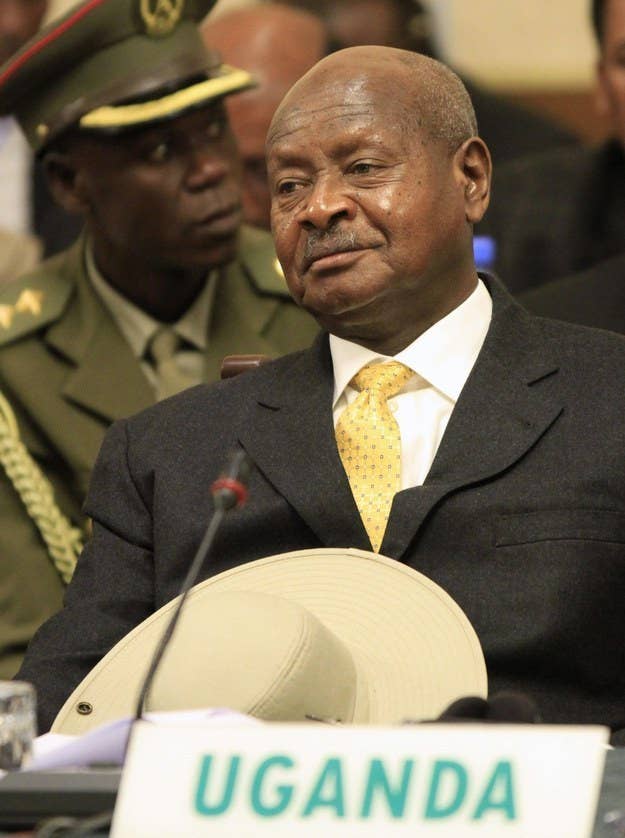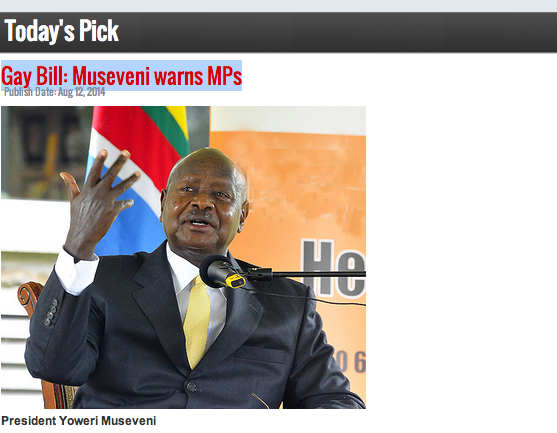
Ugandan President Yoweri Museveni and his party appear to be taking steps to frustrate efforts to revive the country;s Anti-Homosexuality Act, which was struck down on procedural grounds by the Constitutional Court on Aug 1.
Members of Museveni's National Resistance Movement held a party meeting on Monday and then released a statement saying, "We accept the court's ruling." The statement appeared to signal that Uganda's attorney general would drop an appeal of the ruling announced last week. Nicholas Opiyo, , told BuzzFeed he had confirmed that in conversations with some of the members of parliament who attended the meeting, but was not aware that the attorney general had taken any formal steps to abort the appeal process announced on Friday.
The party members also said in their statement that they would form a committee of nine members to "analyze" the human rights objections raised in the suit against the Anti-Homosexuality Act. Those objections were never considered by the court because it struck down the law on the basis of parliament having violated rules of procedure when it adopted the law on December 20. The committee will report back in one month, a delay that may anger some of the more than 200 MPs who reportedly signed onto a call for an immediate re-vote on the law. Local news reports said that party members who signed that petition had agreed to drop their support for suspending parliamentary rules to allow them to quickly enact the law again.
The party leadership released this statement, which lists the MPs who will report on the bill. The committee includes the bill's original sponsor, Deputy Whip David Bahati, who is also known as a Museveni loyalist.
A copy of the document on the final decision by the NRM Caucus on the nullified Anti Homosexuality Act . #AHA2014
Museveni also appeared to be sending a message to supporters of the Anti-Homosexuality Act through the press. The New Vision newspaper, which is close to the government, headlined its story on the meeting, "Gay Bill: Museveni warns MPs."

The story begins, "President Yoweri Museveni has advised the National Resistance Movement (NRM) Parliamentary caucus not to rush the re-enactment of an anti-homosexuality law after its nullification by the Constitutional Court due to lack of quorum."
According to anonymous sources in the meeting, the president complained that his advice on the law had been disregarded in the past, perhaps referring to his attempts to derail the law before he ultimately signed it in late February. The quotes attributed to Museveni in the article were typically cryptic, simultaneously seeming to try to appear that he supported the law but also that he would prefer the question went away because of the impact of pressure from international donors. The story reported:
Addressing the NRM Parliamentary Caucus at State House Entebbe yesterday, President Museveni told MPs that the law was not a priority for the country's development even as there was need to protect the family institution.
"A country which has no vision punishes a divided house. We need to work together through consensus and use of collective methods," a source quoted Museveni as saying.
According to the source, who preferred anonymity, the President asked the MPs to debate the law when it is re-tabled in Parliament without any emotional feelings, for the betterment of the country and international relations.
"This is now an issue of Semusota guli muntamu (a snake which has entered into a cooking pot). If we try to kill the snake, we may break the pot, if we don't we won't" the President reportedly told the caucus, citing a Luganda saying used to describe a delicate situation that poses a serious dilemma.
Though Museveni's true intentions remained unclear, Opiyo, the lawyer, said he was encouraged that the president appeared to be moving in the right direction relative to his full-throated embrace of the law after he signed it.
"If those statements were [actually] made by the president, they would mark a fundamental departure from the hardline position that the president had a couple months ago," Opiyo said. "But I also think he's caught between a growing number of local actors to support that law."
These include members of his own party, especially House Speaker Rebecca Kadaga, who forced the vote on the bill on December 20 and participated in an event just before the party meeting calling for the bill's reinstatement. But the methodical tone of reports that followed the meeting suggest Museveni and other party leaders had sent a clear message to cool off the debate.
